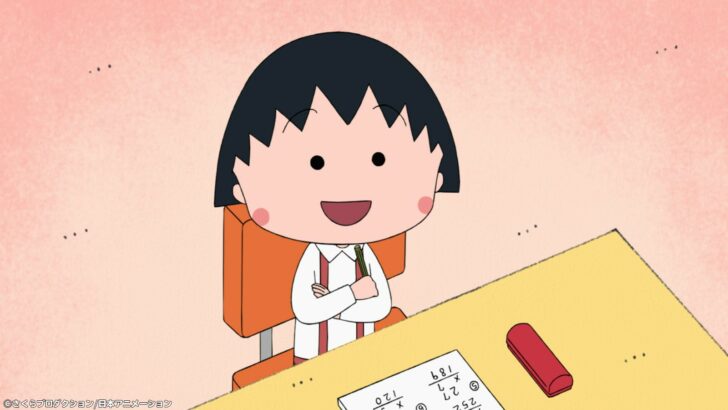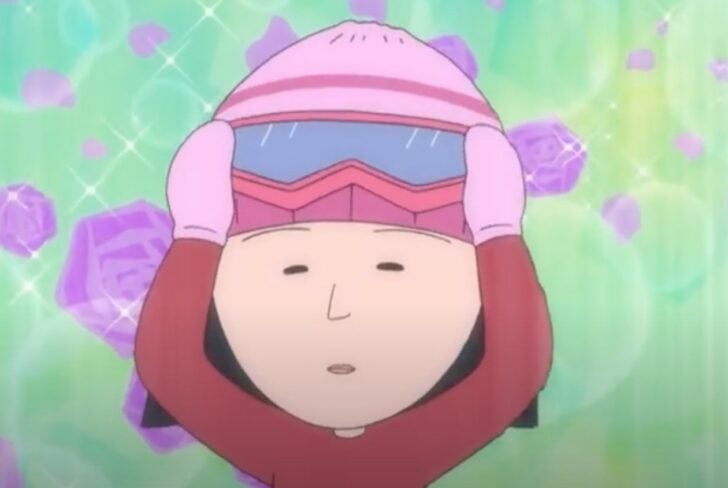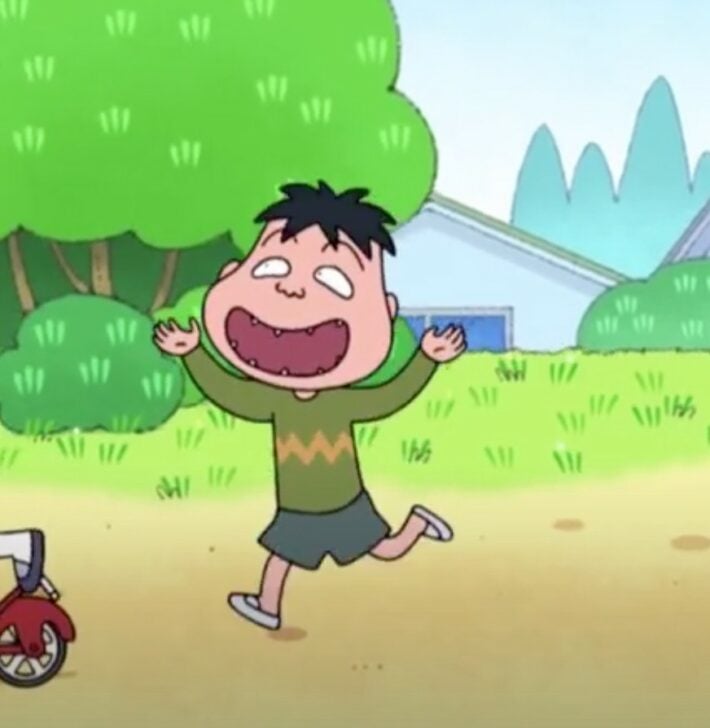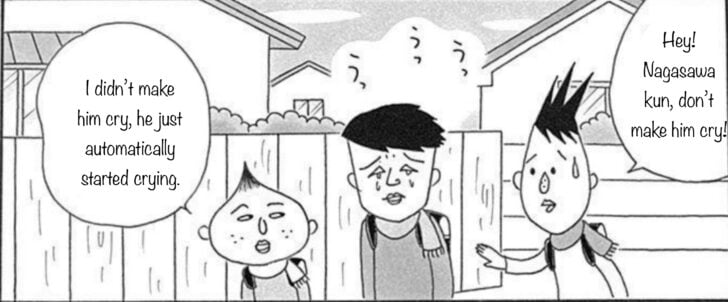Share this link via
Or copy link
Below are navigation links that will take you to the main text and navigation menus.
26,551 first names, 70,620 last names, 333,585 kanji variations.
one of the best Japanese name search tools for your baby!

Contents
Chibi Maruko chan is a long-running comedy series written and illustrated by Momoko Sakura based on her childhood experience. Maruko is a happy and easy-going 9-year-old girl who lives with her parents, grandparents, and older sister. This series is made of individual episodes about Maruko’s daily life which involves her family and unique classmates.

Image by: Chibi Maruko chan official anime website © Sakura production / Nihon animation
There is no English title for this series. Chibi Maruko chan is the nickname of the main character Momoko. ‘Chibi’(ちび) means little and ‘Maruko’(まる子) is a nickname given to Momoko by her friends and family. You put “Chan” at the end of girls’ names, especially little ones.

Image by: Chibi Maruko chan official anime website © Sakura production / Nihon animation
In Japanese culture, names have significant meanings that are supposed to represent you as a person. Names can be expressed in hiragana, katakana, and kanji. Let’s find out the meanings of some names of characters in Chibi Maruko chan.

Image by: Chibi Maruko chan official anime website © Sakura production / Nihon animation
Also known as Maruko, which is her nickname that most people call her. ‘Sakura’ (さくら) is cherry blossom and ‘Momo’ (もも) is peach. ‘Ko’(子) is a common ending for a girl’s name. She was called Chibi Maruko because of her tiny size (Chibi) and chubby face (Maru). There is a ‘Ko’ at the end of her name because she is a little girl.

Image by: Chibi Maruko chan Ep801 © Sakura production / Nihon animation
‘No’(野) is field, ‘Guchi’(口) is mouth, ‘Shou’ also read as ‘Emi’(笑) is laugh and ‘Ko’(子) is a common ending for a girl’s name. She is a very serious classmate who hardly shows any emotion but actually, she loves heavy metal and comedy.

Image by: Chibi Maruko chan Ep335 © Sakura production / Nihon animation
‘Maru’(丸) is a circle and ‘O’(尾) is tail. ‘Sue’(末) means end or last and ‘O’(男) is man. Sueo with his signature glasses is the class leader who is always trying to keep the class in place.

Image by: Chibi Maruko chan Ep1195 © Sakura production / Nihon animation
‘Yamada’(山田) is one of the most common Japanese family names. ‘Shou’(笑) means to laugh and ‘Ta’(太) means big. As you can tell from his name, he is a happy boy who appears to be laughing all the time.

Image by: Chibi Maruko chan Ep1177 © Sakura production / Nihon animation
‘Yama’(山) is mountain, ‘Ne’(根) is root and ‘Tsuyoshi’(強) means strong. Tsuyoshi wishes to be a brave strong boy, however, unlike his name, he is a wimp and often gets a stomach ache under pressure.

Image by: Chibi Maruko chan Ep388 © Sakura production / Nihon animation
‘Ko’(小) means small, ‘Sugi’(杉) is cedar tree and ‘Futoshi’(太) means big. He is a plump boy who loves to eat.
Here are some useful phrases from Chibi Maruko chan which will help you along with your Japanese studies!

Image by: Chibi Maruko chan comic 1 chapter 8 © Momoko Sakura / Shueisha Inc
“Doudatta?” Is a casual way of asking how was it? “Suggoi” means very and is the same as “Sugoi” but is emphasized.

Image by: Chibi Maruko chan comic 17 Ep 127 © Momoko Sakura / Shueisha Inc
“Jidoutekini” (自動的に) means automatically, it is not common to say it this way however Nagasawa-Kun’s insidious character often makes him speak in a sarcastic way.

Image by: Chibi Maruko chan comic 9 Ep 57 © Momoko Sakura / Shueisha Inc
Japanese people don’t often like to express their feelings much, however, sometimes you have to say it. The phrase “Ashidematoi’ (足手纏い) is often used when someone is slowing you down. “Zubari” (ズバリ) means direct or frankly.

Image by: Chibi Maruko chan comic 7 Ep 38 © Momoko Sakura / Shueisha Inc
You put “Mon”(もん) at the end of a sentence when you want to kid around or be silly. Maruko’s father actually saw her secret diary and is trying to fool around so instead of saying ‘Mitenai’ (見てない) he said ‘Mitenaimon’ (見てないもん.)
Sort by Most Kanji Variations
This is the order of names with many variations of kanji.
Basically, names with more variations are more common and familiar to the Japanese.
Sort by Most Viewed
The names are sorted by the number of times they have been viewed on this site. This ranking is based on the behavior of users around the world, including Japan, so it does not mean that the names are commonly viewed by Japanese people only.
Please note that just because a name has been viewed more times does not mean it is a famous name in Japan.
What is Hiragana?
Hiragana is a syllabary used in written Japanese, which originated from the cursive style of Kanji.
What is Katakana?
Katakana is also a Japanese syllabary. Basically, the characters don't have any meaning by themselves, they only represent the sounds.
Japanese try to express the words came from foreign languages with the most similar sounds in Japanese using Katakana.
What is English Transcription?
English Transcription is a term used when translating Japanese names into English. It represents a romanised version of the name with the aim of reproducing the pronunciation as accurately as possible. English Transcription can also be used for name searches.
Japanese Style Nickname
In Japan, nicknames are commonly used to express familiarity and affection. Here are key features and contexts:
Shortened Forms: Names are often shortened for ease and intimacy, such as 'Yuki' from 'Yukiko' or 'Taka' from 'Takashi'.
Suffixes: Terms like 'chan' for girls and 'kun' for boys are added to names among close friends and family. However, 'chan' can also be used for boys during childhood. Additionally, among adults who are very close, like best friends, 'chan' may still be used to convey affection and familiarity. More Details
Usage and Cultural Aspects: Nicknames are typically used in informal settings among friends, family, or close colleagues, and are not suitable for formal or professional environments. The use of a nickname suggests a degree of intimacy and should reflect the nature of the relationship. Young people often demonstrate creativity in their social interactions by crafting unique nicknames.
Note: In Japanese, the long vowel sound is indicated by a special character called a "chōonpu" (長音符), which looks like a horizontal dash (ー). This character serves to extend the duration of the vowel sound immediately preceding it. For instance, in the name "あーちゃん" (A-chan), the "あ" (A) is extended, producing a prolonged "ah" sound, similar to the "a" in "father."
Households?
The names are sorted by the number of Japanese households where the surname is used.
The more households there are, the more famous and common the surname is.
About this site's data of last names
